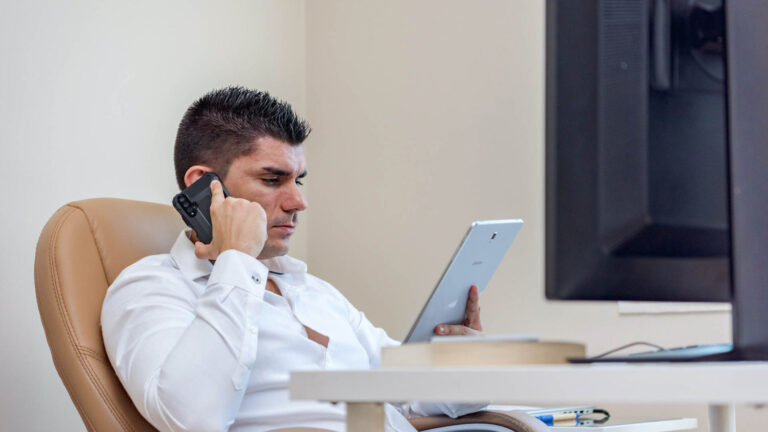In job interviews, one question that is commonly asked is, “What was your biggest challenge?” This question is designed to assess how candidates handle obstacles and difficult situations. It allows employers to gain insights into how an individual deals with adversity, problem-solving skills, and their level of perseverance.
Preparing a thoughtful answer to this question is crucial. A well-crafted response can provide the interviewer with more information about the candidate’s work style, and it can set them apart from other candidates who may have given generic answers. Practicing through interview preparation coaching can help candidates deliver confident and impactful responses.
Answering this question effectively not only reflects your professional maturity but also signals your ability to contribute under pressure. Alongside sharpening your response strategy, consider strengthening your entire application with a customized, ATS-optimized resume to maximize your visibility with recruiters.
Ultimately, answering “What was your biggest challenge?” is an opportunity to showcase one’s strengths and character. With the right approach, candidates can use this question to their advantage and stand out as the perfect fit for the job.
Understanding the Question
When an employer asks, “What was your biggest challenge?” during a job interview, they are not merely interested in the candidate’s personal life experiences. In fact, this question is strategically designed to identify what the interviewee’s strengths and weaknesses are, as well as their problem-solving skills and ability to handle pressure.


To deconstruct the question, it’s important to understand that employers want to learn about the specific challenge the candidate faced, how they tackled it, and what the outcome was. They are looking for evidence of how the interviewee approached problem-solving and how they responded to difficulties or setbacks in the past.
Employers ask this question for various reasons. Firstly, it provides insight into the candidate’s work ethic, character, and ability to overcome obstacles. Secondly, by analyzing how the interviewee handled the challenge, employers can gain a better understanding of how they may handle difficult situations and pressures in the future. Thirdly, employers want to measure the candidate’s level of self-reflection, honesty, and vulnerability.
The role of this question in the interview process is to assess the candidate’s suitability for the job. The way in which the interviewee answers this question can reveal a lot about their personality, character, and suitability for the role they are being considered for. Furthermore, by allowing the interviewee to discuss real-life examples of their problem-solving skills and work under pressure, the interviewer can gauge how the candidate would fit in with the company culture and how they would approach tasks relevant to the job.
Understanding the question “What was your biggest challenge?” requires deconstructing the question to identify what employers are looking for, exploring why employers ask this question, and understanding the role of this question in the interview process. By doing so, candidates can adequately prepare for the question and provide a thoughtful and concise response that showcases their skills and experience.
Knowing Your Audience
As a job seeker, it’s crucial to understand the company’s culture, values, mission, and history before you go for an interview. Knowing your audience helps you tailor your responses to fit the company’s expectations and increases your chances of success. For long-term career planning and interview strategy alignment, consider professional career consulting services that can help guide your job search approach.
Understanding the Company’s Culture
Culture defines the workplace environment and is an integral component of job satisfaction. By understanding the company’s culture, you can gauge if it aligns with your values and work style. Research the company’s dress code, work hours, and social norms to avoid any surprises during your interview.


Researching the Company’s Values, Mission, and History
Take some time to research the company’s values, mission, and history to get an idea of what it stands for and its goals. This information can help you understand the company’s priorities and identify what a successful employee looks like in their eyes. Knowing this can help you tailor your responses to reflect what the company wants and show that you share their values.
Analyzing the Job Requirements and Identifying Relevant Challenges
The job requirements provide an indication of the skills and qualifications needed to succeed in the role. Analyzing the requirements helps you identify the relevant challenges you might face in the role. This information can help you prepare better for the interview and show that you’re aware of what it takes to succeed in the role.
For the question “What was your biggest challenge?,” understanding the job requirements and identifying relevant challenges can help you tailor your response to reflect a challenge that is relevant to the job. Be honest about the challenge and show how you overcame it. This response will prove that you have what it takes to handle challenging situations in the role.
Knowing your audience is critical for interview success. Understanding the company’s culture, values, mission, and history, along with analyzing the job requirements and identifying relevant challenges, will help you prepare for your interview and increase your chances of landing the job.
Factors to Consider When Choosing a Challenge
When preparing to answer the job interview question, “What was your biggest challenge?” there are several factors to consider when selecting the right situation to discuss.


Firstly, it’s essential to identify a situation that had a quantifiable impact. This means choosing a challenge that had tangible results or outcomes that can be measured. For example, if the challenge was to increase sales in a particular market, you should be able to provide concrete numbers that demonstrate your success.
It’s also vital to ensure that the situation is professional in nature. Avoid discussing personal challenges, such as dealing with a difficult family member or health issue. Instead, focus on challenges that you faced in the workplace and how you overcame them. Employers want to see that you’re capable of handling professional challenges, not personal ones.
Finally, when choosing a challenge to discuss, try to select an experience that can be presented positively, even if the situation was difficult. Remember that the goal of this interview question is to showcase your problem-solving, adaptability, and resilience. Demonstrate your ability to take on challenges with a positive attitude, and always focus on the solutions you implemented.
When choosing a challenge to discuss in response to the job interview question, “What was your biggest challenge?” make sure to choose a situation with a quantifiable impact, ensure it is professional in nature, and select an experience that can be presented positively.
Examples of Appropriate Responses
When asked “What Was Your Biggest Challenge?” during a job interview, here are some appropriate responses:
1. Sharing a challenge you faced in a previous job
During my previous job, I faced a challenge when one of our major clients suddenly stopped working with us. This caused a significant loss of revenue and put us at risk of not meeting our targets. Instead of dwelling on the loss, I took it upon myself to research and identify prospects to fill the revenue gap. I worked closely with our sales team to develop a strategy to reach out to these prospects, which eventually helped us exceed our targets for that quarter.
2. Discussing your approach to overcoming an issue in a team project
In a team project we were working on, we faced a challenge when a member of the team quit midway. As a result, a significant portion of the project was left incomplete. To overcome this issue, I took it upon myself to communicate with the remaining team members and re-assign the tasks that were left unfinished. I worked closely with everyone to ensure they had everything they needed to complete their new assignments on time. We were able to deliver the project on time and with high quality.


3. Detailing how you grew from a past professional difficulty
In my previous role, I had to work on a project that was not in line with my area of expertise. It was a daunting challenge but I took it as an opportunity to learn and grow. I consulted with other professionals in the field and invested time in learning the necessary skills to complete the project. With hard work and dedication, I was able to deliver the project on time and with great quality. I learned that stepping out of your comfort zone can help you learn new things and become a better professional.
Strategies for Answering the Question
When it comes to answering the job interview question, “What was your biggest challenge?” there are several strategies you can use to craft an effective response that leaves a positive impression with your interviewer.
Outlining an Effective Interview Response
One approach is to outline your answer in a clear and concise format. This might include discussing the challenge, the actions you took to address it, and the outcome. By structuring your response in this way, you demonstrate your ability to tackle problems and find solutions.
Specific Phrases to Use While Providing Answers to the “Biggest Challenge” Interview Question
Another strategy is to use specific phrases when providing your answer. For example, you might say that the challenge “tested your problem-solving skills” or that you “overcame the obstacle by leveraging your creativity and resourcefulness.” These types of phrases help to convey your strengths and highlight your ability to handle difficult situations.
How to Position the Challenge in a Positive Light
Perhaps the most important strategy for answering this question is to position the challenge in a positive light. Rather than dwelling on the negative aspects of the situation, focus on the positive outcomes and what you learned from the experience. For example, you might discuss how the challenge helped you grow both personally and professionally, or how it taught you valuable lessons that you can apply to future situations.
When answering the question, “What was your biggest challenge?” it’s important to outline an effective response, use specific phrases to highlight your strengths, and position the challenge in a positive light. By doing so, you can demonstrate your ability to handle adversity and show that you’re a strong candidate for the job.


Preparing for the Big Day
Congratulations on securing an interview! Now it’s time to prepare for the big day. Here are some tips to help you:
Practicing Answering the Question
The “What Was Your Biggest Challenge?” question can be tricky. It’s important to have a structure for your answer that highlights the challenge, the actions you took, and the positive outcome. Practice your response by speaking out loud or with a friend or family member. You’ll gain clarity on your delivery, tone, and pacing. Don’t memorize your answer word for word, but be familiar with the key points and supporting details.
Tips for Calming Interview Nerves
Interviews can be nerve-wracking, but there are a few things you can do to alleviate stress:
- Take deep breaths: Deep breathing is a proven stress reducer. Take a few deep breaths before the interview starts and as you answer questions.
- Visualize a positive outcome: Imagine yourself acing the interview and getting the job offer.
- Sip water: Sipping water can help you feel grounded and calm. Plus, it can give you a brief pause to collect your thoughts.
- Dress comfortably: Wearing clothes that make you feel good can help you project confidence.
Reviewing the Job Description and Company Values
Reviewing the job description and company values is critical to your success in the interview process. Take some time to research the company’s mission, values, and culture. Try to connect your skills and experiences to the needs of the company. This will show that you’re passionate about the position and a good fit for the team. Additionally, you can use this information to ask thoughtful questions during the interview.
Preparing for an interview takes time and effort. Practice answering the “What Was Your Biggest Challenge?” question, use tips to calm your nerves, and review the job description and company values. With preparation, you’ll be ready to tackle any challenge and shine in the interview.
Understanding Interview Ethics
During job interviews, there are certain ethical standards that both the interviewer and candidate must adhere to. This section will cover the following:


- Understanding what interviewers cannot ask
- Knowing your rights as a candidate
- Addressing inappropriate interview questions professionally
Understanding what interviewers cannot ask
To ensure fairness and avoid discrimination, interviewers cannot ask certain questions during a job interview. These include questions about an applicant’s race, ethnicity, national origin, religion, age, gender identity, sexual orientation, marital status, disabilities, and pregnancy status.
Other types of questions that may be considered inappropriate include those related to an applicant’s financial situation or personal life, as well as questions about their political beliefs, affiliations, or activities. It’s important to remember that these questions are not relevant to the job and can create a hostile environment that discourages certain candidates from applying.
Knowing your rights as a candidate
As a candidate, you have the right to be treated fairly and without discrimination during the interview process. If you feel that an interviewer has violated your rights by asking inappropriate questions or engaging in discriminatory behavior, you can file a complaint with the Equal Employment Opportunity Commission.
In addition, you have the right to ask questions about the job and the company during the interview to determine if it’s a good fit for you. You also have the right to ask for clarification if you don’t understand a question or if you need more information before answering.
Addressing inappropriate interview questions professionally
If you are asked an inappropriate question during a job interview, it’s important to handle the situation professionally. You can politely decline to answer the question by saying something like, “I’m not comfortable discussing that topic” or “I prefer not to answer personal questions.”


You can also try redirecting the conversation back to your qualifications and skills related to the job. For example, if an interviewer asks about your marital status, you could say, “While my personal life is not relevant to my qualifications for this position, I can tell you more about my experience in managing teams and meeting project goals.”
Understanding interview ethics is crucial for both interviewers and candidates. As a candidate, it’s important to know your rights, recognize inappropriate questions, and address them professionally. By doing so, you can ensure a fair and respectful interview process that leads to the best candidate being selected for the job.
The Outcome of the Question
After discussing your biggest challenge, it’s important to assess the interviewer’s reaction. Look for signs of engagement and interest, such as nodding, leaning forward, or asking follow-up questions. If the interviewer seems disinterested or dismissive, try to refocus on the skills and strengths that you gained from overcoming the challenge.
To leverage the challenge you discuss to your advantage, highlight how it demonstrated your resilience, problem-solving skills, and growth mindset. Emphasize how these skills and qualities are relevant to the position you are applying for. Show how you can apply what you learned from the challenge to the job and add value to the company.
Strengthen your case for the position by connecting your biggest challenge to your career goals and the company’s mission. Show how the skills you developed through overcoming the challenge align with the requirements of the job and the company’s values. Demonstrate your enthusiasm and commitment to the job and explain how you can contribute to the organization’s success.
Discussing your biggest challenge in a job interview can be a powerful way to showcase your skills and strengths. By assessing the interviewer’s reaction, leveraging the challenge to your advantage, and strengthening your case for the position, you can make a strong impression and increase your chances of getting hired.
Case Study: Good Answer Vs Bad Answer
In any job interview, there is always a possibility for the interviewer to ask about a candidate’s biggest challenge. This question is designed to gauge the candidate’s problem-solving skills, resilience, and ability to work under pressure. However, not all answers are created equal. In this case study, we will examine a detailed example of a good answer and a bad answer, and analyze how each affected the outcome.
Detailed Example of a Good Answer
Interviewer: What was the biggest challenge you have faced in your career so far?
Candidate: My biggest challenge was when I had to lead a team on a project that had a tight deadline and a high visibility. The project was already behind schedule when I took over, and the team was demoralized. I knew I had to motivate and inspire them to work harder, but I didn’t want to come off as a micromanager. So, I schedule one-on-one meetings with each team member to listen to their concerns and ideas. I also organized a team-building event to boost morale. Through effective communication and collaboration, we were able to meet the deadline and deliver a successful project.
This answer is a good one because it shows the candidate’s ability to lead a team, identify and resolve problems, and effectively communicate with team members. The candidate also gave a specific example that demonstrated their skills in action, rather than just making vague statements about their abilities.
Detailed Example of a Bad Answer
Interviewer: What was the biggest challenge you have faced in your career so far?
Candidate: My biggest challenge was when I had to deal with a difficult coworker. They were always arguing and causing drama in the workplace, which made it hard for me to focus on my work. I tried talking to them, but it didn’t work, so I just tried to avoid them as much as possible.
This answer is a bad one because it doesn’t demonstrate any problem-solving skills or resilience. The candidate’s response indicates that they lack the ability to handle conflicts and challenges effectively. It also doesn’t give any specific details about how the candidate attempted to address the situation, which suggests they gave up quickly and didn’t try to find a solution.
Analyzing Both Examples and How It Affected the Outcome
The first candidate demonstrated their ability to handle a difficult situation by taking a proactive approach to leadership. By organizing one-on-one meetings and team-building events, they were able to motivate and inspire their team to work harder, while still maintaining an open and collaborative work environment. This approach shows that the candidate has excellent communication and leadership skills and can handle high-pressure situations.
On the other hand, the second candidate’s response shows that they don’t have the necessary skills to deal with challenging situations. Avoiding difficult coworkers is not a viable solution in the workplace, and it’s essential to find a way to address the problem effectively.
Related Articles
- Do I Need a Cover Letter? Are Cover Letters Still Necessary
- Stay at Home Mom Resume Examples and Writing Tips for 2023
- Patient Registrar Resume: Winning Examples for 2023
- Business Controller Job Description & Duties for 2023
- Staff Accountant Resume Samples & Guide for 2023








